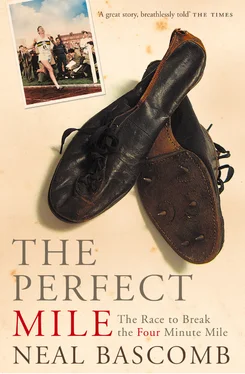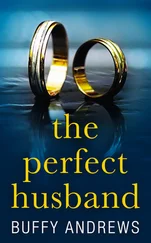He always ran a three-quarter-mile trial before a race to fix in his mind his fitness level and pace judgement. This trial was particularly important because in ten days’ time, given that he qualified in the heats, he would run the race he had dedicated the past two years to winning: the Olympic 1,500m final. A good time this afternoon was crucial for his confidence.
‘Two fifty-two nine,’ McWhirter said.
Bannister was taken aback. Williams and Chataway were just as incredulous. The time had to be wrong.
‘At least, Norris, you could have brought a watch we could rely on,’ Bannister said.
McWhirter was cross at such a suggestion. But he knew one way to make sure his stopwatch was accurate. He dashed to the telephone booth near the concrete stadium stands, put in a penny coin, and dialled the letters T-I-M. The phone rang dully before a disembodied voice came on to the line, tonelessly saying, ‘And on the third stroke, the time will be two thirty-two and ten seconds – bip–bip–bip – and on the third stroke, the time will be two thirty-two and twenty seconds – bip–bip–bip …’ Norris checked his stopwatch: it was accurate.
After McWhirter returned and confirmed the result to the others, they agreed that Bannister was certain of a very good show in Helsinki. They dared not predict a gold medal, but they knew that Bannister considered a three-minute three-quarter mile the measure of top racing shape. He was now seven seconds under this benchmark. All of his training for the last two years had been focused on reaching his peak at exactly this moment – and what a peak it was. He was in a class by himself. The critics – coaches and newspaper columnists – who had condemned him for following his own training schedule and not running in enough pre-Olympic races would soon be silenced.
There was, however, a complication, which McWhirter had yet to tell Bannister. As a journalist for the Star, McWhirter kept his ear to the ground for any breaking news, and he had recently heard something very troubling from British Olympic official Harold Abrahams. Because of the increased number of entrants, a semi-final had been added to the 1,500m contest. In Helsinki, Bannister would have to run not only a first-round heat, but also a semi-final before reaching the final.
The four men bundled into McWhirter’s black Humber and headed back to the city for the afternoon.
When Bannister was not racing around the track, where he looked invincible, the 23-year-old appeared slighter. In trousers and a shirt, his long corded muscles were no longer visible, and it was his face one noticed. His long cheekbones, fair complexion, and haphazard flop of straw-coloured hair across the forehead gave him an earnest expression that turned boyish when he smiled. However, there was quiet aggression in his eyes. They looked at you as if he was sizing you up.
As Norris McWhirter turned out of the park, he finally said, ‘Roger … they put in a semi-final.’
They all knew what he meant: three races in three days. Bannister had trained for two races, not three. Three required a significantly higher level of stamina; Bannister had concentrated on speed work. With two prior races, the nervous energy he relied on would be exhausted by the final – if he made the final. It was as if he were a marksman who had precisely calibrated the distance to his target, then found that his target had been moved out of range. Now it was too late to readjust the sights.
Bannister looked out the window, saying nothing. Away from Motspur Park with its trees and long stretches of open green fields, the roads were choked with exhaust fumes and bordered by drab houses and abandoned lots overgrown with weeds. The closer they got to London, the more they could see of the war’s destruction, the craters and bombed-out walls that had yet to be bulldozed and rebuilt. A fine layer of soot clouded the windows and greyed the rooftops.
The young miler didn’t complain to his friends, although they knew he was burdened by the fact that he was Britain’s great hope for the 1952 Olympics. He was to be the hero of a country in desperate need of a hero.
To pin the hopes of a nation on the singlet of one athlete seemed to invite disaster, but Britain at that time was desperate to win at something. So much had gone wrong for so long that many questioned their country’s standing in the world. Their very way of life had come to seem precarious. ‘It is gone,’ wrote James Morris of his country in the 1950s. ‘Empire, forelock, channel and all … the world has overtaken [us]. We are getting out of date, like incipient dodos. We have reached, none too soon, one of those immense shifts in the rhythm of a nation’s history which occur when the momentum of old success is running out at last.’ The First World War had put an end to Britain’s economic and military might. The depression of the 1930s slowly drained the country’s reserves, and its grasp on India started to slip. Britain moved reluctantly into the Second World War, knowing it couldn’t stand alone against Hitler’s armies. Once the British joined the fight, they had to throw everything into the effort to keep the Nazis from overrunning them. When the war was over they discovered, like the Blitz survivors who emerged onto the street after the sirens had died away, that they were alive, but that they had grim days ahead of them.
Grim days they were. Britain owed £3 billion, principally to the United States, and the sum was growing. Exports had dried up, in large part because half of the country’s merchant fleet had been sunk. Returning soldiers found rubble where their homes had once stood. Finding work was hard, finding a place to live harder. Shop windows remained boarded up. Smog from coal fires deadened the air. Trash littered the alleys. There were queues for even the most basic staples, and when one got to the front of the line, a ration card was required for bread (three and a half pounds per person per week), eggs (one per week), and everything else (which wasn’t much). Children needed ration books to buy their sweets. Trains were overcrowded, hours off schedule, and good luck finding a taxi. If this was victory, asked a journalist, why was it ‘we still bathed in water that wouldn’t come over your knees unless you flattened them?’
And the blows kept falling. The winter of 1946–7, the century’s worst, brought the country to a standstill. Blizzards and power outages ushered in what the Chancellor of the Exchequer called the ‘Annus Horrendus’. It was so cold that the hands of Big Ben iced up, as if time itself had stopped. Spring brought severe flooding, and summer witnessed extremely high temperatures. To add to the misery, there was a polio scare.
Throughout the next five years, ‘austerity’ remained the reality, despite numerous attempts to put the country back in order. Key industries were nationalised, and thousands of dreary prefabricated houses were built for the homeless. In 1951 the Festival of Britain was staged to brighten what critic Cyril Connolly deemed ‘the largest, saddest and dirtiest of the great cities, with its miles of unpainted half-inhabited houses, its chopless chop-houses, its beerless beer pubs … its crowds mooning around the stained green wicker of the cafeterias in their shabby raincoats, under a sky permanently dull and lowering like a metal dish-cover’. The festival, though a nice party, was an obvious attempt to gloss over people’s exhaustion after years of hardship. Those who were particularly bitter said that the festival’s soaring Skylon was ‘just like Britain’, standing there without support. To cap it all, on 6 February 1952 London newspapers rolled off the presses with black-bordered pages: the king was dead. Crowds wearing black armbands waited in lines miles long to see George VI lying in state in Westminster Abbey. As they entered the hall, only the sounds of footsteps and weeping were heard. A great age had passed.
Читать дальше












